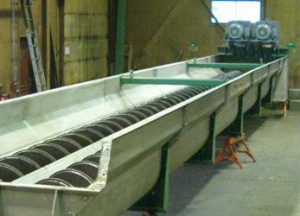 How to select a screw conveyor: Continental Conveyor’s best tips
How to select a screw conveyor: Continental Conveyor’s best tips
December 19, 2019 REDWIRE is news you can use from leading suppliers. Powered by FRASERS.
Posted by Continental Conveyor Ltd
Continental Conveyor, established in 1963, specializes in the design, engineering, and manufacturing of mechanical bulk... Read more
Subscribe
Free REDWIRE e-newsletter

Continental employs experts in screw conveyors.
Continental Conveyor is a major Canadian source of material-handling equipment, including a line of screw conveyors. Among the most versatile, economical bulk conveyors on the market, these devices can be used as feeders, distributors, collectors, or mixers. Because there are many options available for a broad variety of applications, there are certain factors to consider to ensure one is buying the most appropriate screw conveyor for one’s unique needs in a workplace.
Capacity, power, and more
Having designed, engineered, and manufactured mechanical bulk material-handling equipment and systems since 1963, Continental knows all about screw conveyors. The company’s staff and engineers are available to help customers with the right recommendations for specific applications. Continental suggests considering the following factors in seeking an appropriate screw conveyor:
- Capacity. Note how much material needs to be moved. The capacity of a screw conveyor depends on the conveyor’s diameter, trough loading, and speed. These factors vary the amount of material the conveyor can handle per hour. It is important to remember that a speed too high can not only cause product traffic jams, but also cause quicker wear of system components.
- Material analysis. To determine the appropriate diameter for the conveyor, consider the material that it is going to handle. The material to be conveyed will affect the horsepower requirement. Also bear the abrasiveness of the material in mind: the more abrasive the material is, the more the conveyor components are being subjected to wear.
- Operating cycle. Continental advises customers to consider how often they will use their screw conveyors. For example, a conveyor that operates for only two hours a day does not need construction as heavy as one that is intended for constant, 24-7 use. The operating cycle determines the necessary material thickness and drive sizes for the conveyor.
- Other considerations. In addition to the above factors, customers should also determine the horsepower they need, as well as motor and shaft size, when selecting screw conveyors. For other factors to consider, consult with a company with longtime experience in conveyors – like Continental Conveyor.
To learn more, contact Continental.
Share
Posted by Continental Conveyor Ltd
Continental Conveyor, established in 1963, specializes in the design, engineering, and manufacturing of mechanical bulk... Read more